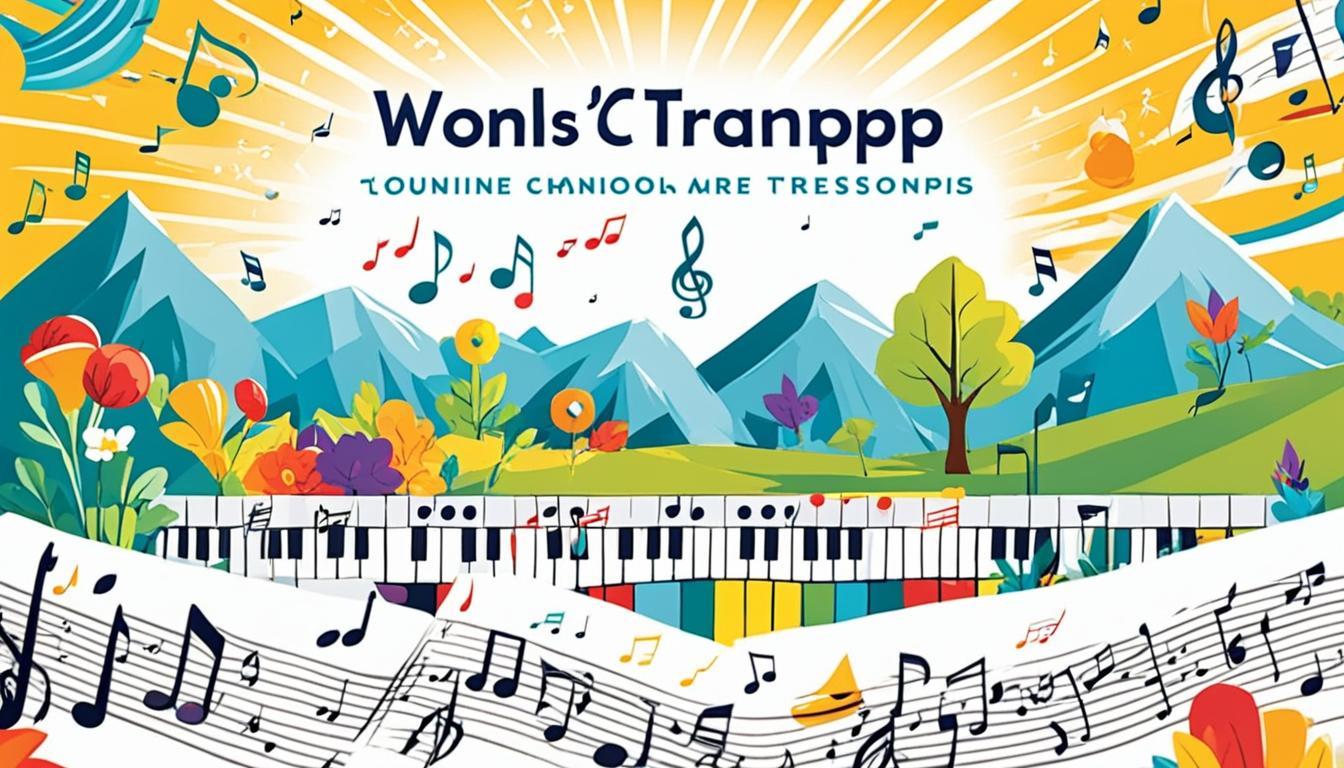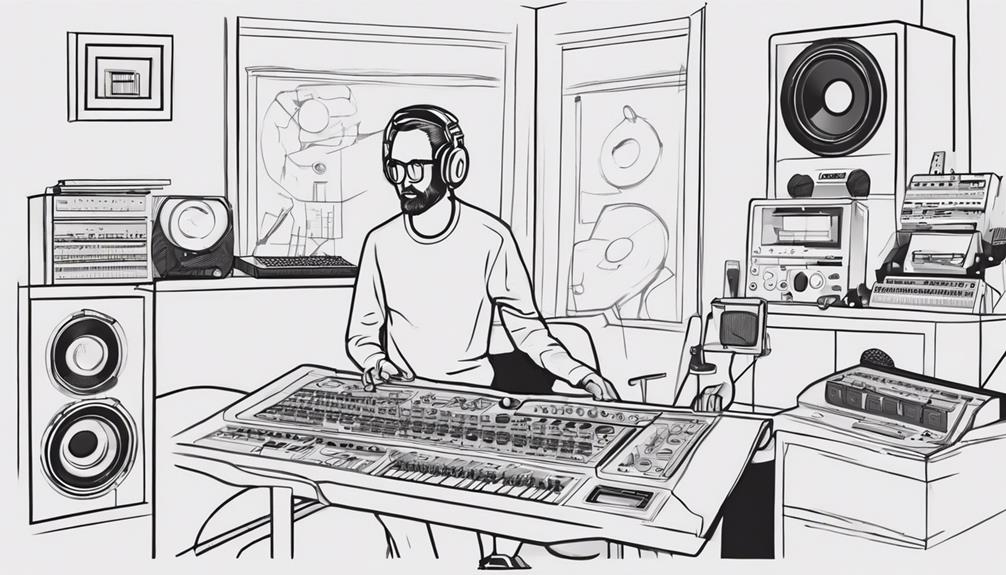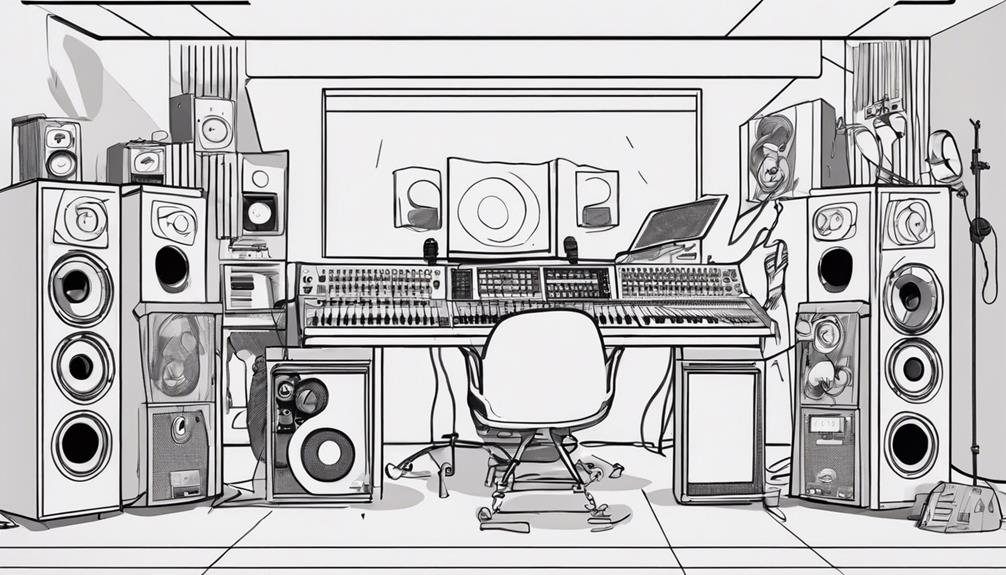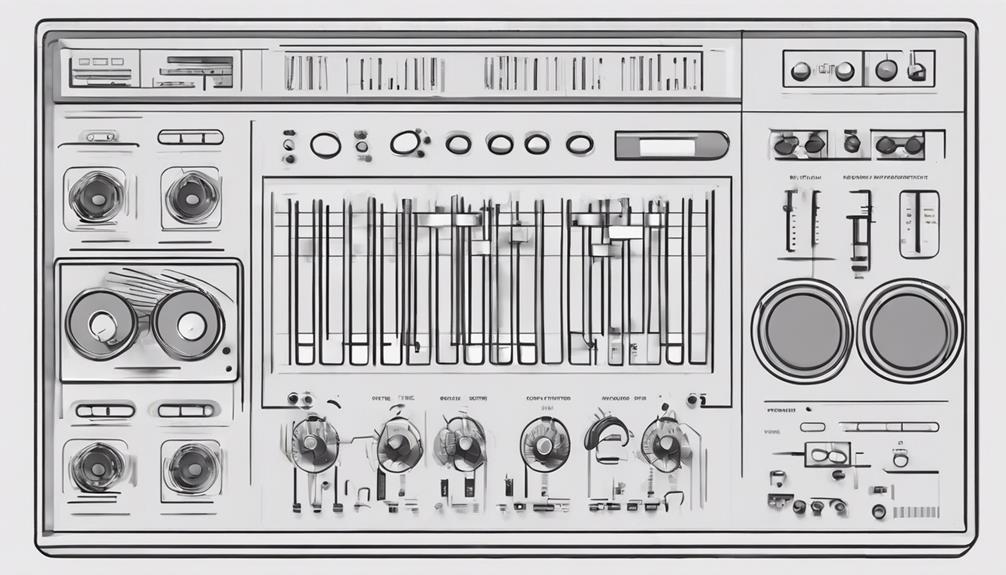The Sound of Music is cherished for its classic tunes and memorable songs. We’ll rank the top songs based on fan favorites and popularity. The list includes hits from both the Broadway show and the film. Let’s explore the best tracks from this legendary musical.
Key Takeaways:
- At the top, “Do-Re-Mi” is beloved for teaching music scales with its flawless tune1.
- “My Favorite Things” comes in second, loved for its joy and heartfelt words1.
- The duet “Sixteen Going on Seventeen” wins hearts with its young romance, ranking third1.
- “The Sound of Music” song stands out as the most iconic, earning the top spot23.
- “Something Good” and “Morning Hymn & Alleluia” get special mentions for their roles in the movie2.
Ranking Every Song in The Sound of Music
Each song from The Sound of Music touches the audience’s heart differently. We’re looking at songs from the Broadway show and the beloved movie. Our rankings reflect each song’s quality and impact.
“Edelweiss” is a touching song that symbolizes hope and freedom. Fans cherish it for its emotional depth and beautiful tune. It shines brightly in the show4.
“My Favorite Things” fills listeners with warmth and joy, especially during the holiday season. Its lyrics bring comfort and happiness, winning many hearts4.
Through “Do Re Mi,” Maria teaches the von Trapp kids to sing using solfege. This catchy song is fun and educational, making it a highlight4.
“Climb Ev’ry Mountain” sends a strong message to never quit. With its powerful sound and lyrics, it inspires listeners. It’s a memorable part of the show4.
“The Lonely Goatherd” is full of joy and energy. Performed by Maria and the kids, its catchy tune makes it a favorite4.
The nuns’ song “Maria” hints at the main character’s free-spirited nature. This upbeat tune perfectly kicks off the musical journey4.
“Sixteen Going On Seventeen” by Rolfe and Liesl is sweet and romantic. Yet, the song’s joy is tinged with sadness due to historical nuances45.
In “So Long, Farewell,” the von Trapp kids delightfully say goodbye. Their performance is playful and showcases their talent4.
“I Have Confidence” wasn’t in the original play but was added to the movie. Maria’s empowering voice in this song speaks to her courage as she starts her new role5.
While we rank these songs, each has its special place in The Sound of Music. They all add to the musical’s charm and success. Here’s a peek at the most memorable tunes for fans over time.
The Bottom of the List
The Sound of Music is loved for many songs, but some are not as popular. These tracks, while not the favorites, still add a special touch to the musical.
“Something Good” doesn’t grab everyone, even though it’s sweet and romantic. Its lower ranking might be because it doesn’t connect as much.
“Processional and Maria (The Wedding)” also isn’t talked about much. Despite depicting Maria’s joyful wedding, it doesn’t stick with people like other scenes.
Even if these songs aren’t the most liked, they still matter. They help tell The Sound of Music’s story, making it richer.
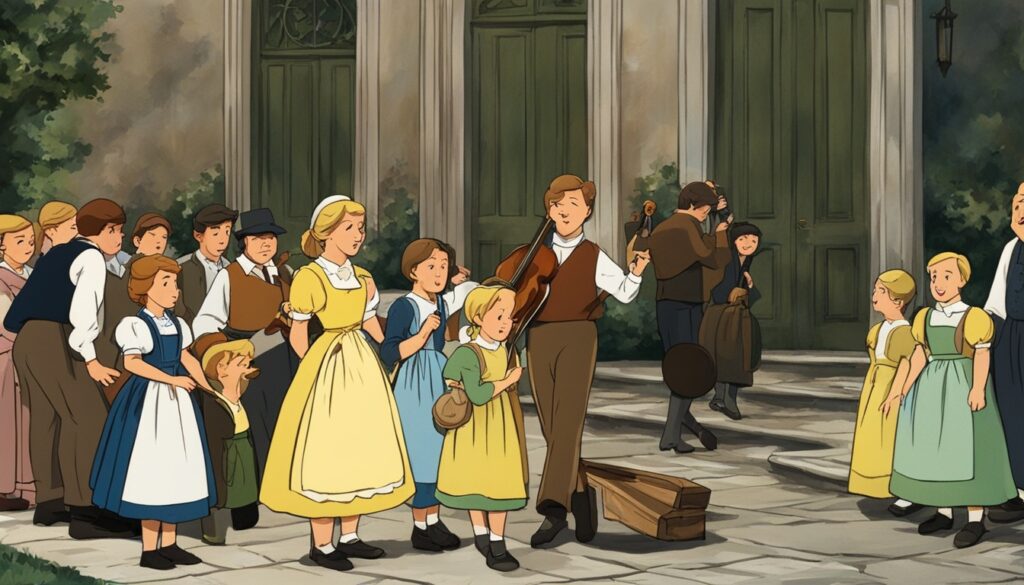
Mid-Ranked Favorites
Some songs from The Sound of Music climbed to the charts’ top. Yet, there are mid-ranked songs that still win hearts. These tracks didn’t get as famous as others, but they hold a dear spot for fans.
“Sixteen Going on Seventeen” (Reprise) is one such song. It shows the growing love between Rolf and Liesl. With its sweet tunes and deep lyrics, it captures the thrill of being young and in love6.
“No Way to Stop It” is another song that audiences love. It’s a lively tune about the clash between old ways and new changes. This song brings out the characters’ struggles, making the musical more exciting. It shows how well the story and characters are built in The Sound of Music6.
Don’t forget “Preludium,” a beautiful piece. It introduces the magical world of the von Trapp family. With its graceful music, it takes listeners to Austria’s hills, filling them with nostalgia and joy6.
These mid-ranked songs from The Sound of Music didn’t top the charts, but they made a big impression. Their uniqueness and role in the musical highlight the soundtrack’s variety. They are vital to the musical’s richness.
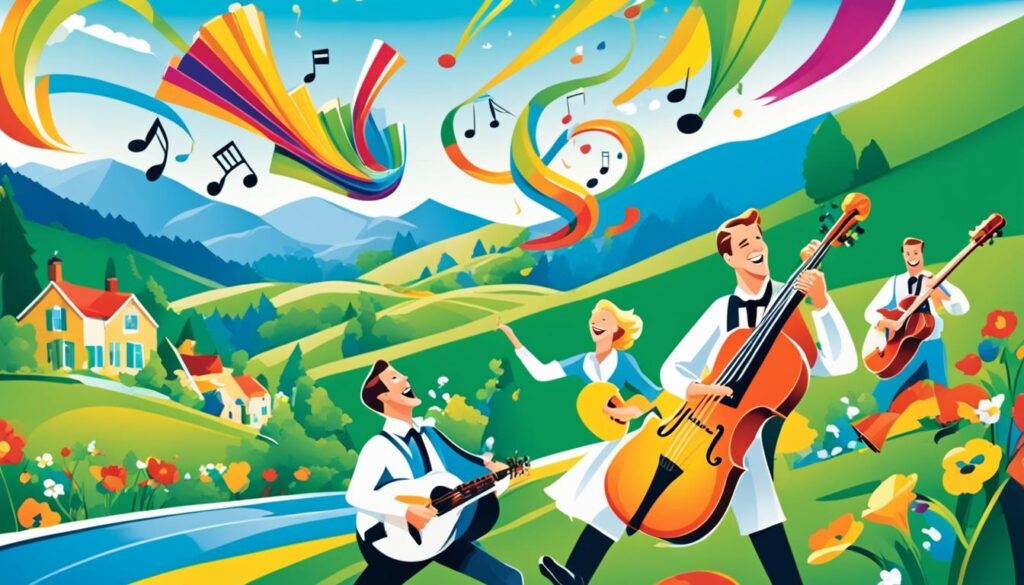
Fans cherish these mid-ranked songs deeply. It shows how much The Sound of Music means to music lovers. Both famous hits and these lesser-known tracks keep the musical’s magic alive. They remind us of the strong impact that music and stories can have.
The Top Ten Hits
Here it is, the moment we’ve all been waiting for. We’re about to reveal the top ten songs from The Sound of Music. These songs are loved for their timeless appeal and emotional impact.
“Climb Ev’ry Mountain” leads this impressive list. Performed by Mother Abbess, it inspires us to chase our dreams and conquer challenges. Its message of hope and Maria’s emotional performance make it unforgettable7.
Next up, “My Favorite Things.” Maria and the von Trapp children sing about the joy in everyday moments. Its catchy tune and simple lyrics have captured hearts worldwide7.
“Do-Re-Mi” showcases Maria teaching musical notes in a fun way. Its catchy tune invites everyone to sing along, delighting audiences for years7.
“Edelweiss” brings a touch of Austria’s tradition and love for the homeland. Captain von Trapp’s rendition is deeply moving, making it a symbol of love and country7.
The title song, “The Sound of Music,” is an ode to music’s beauty. Sung by Maria, its melody and lyrics perfectly capture the film’s essence7.
“Sixteen Going on Seventeen” is a sweet duet about young love. Rolf and Liesl charm us with their catchy tune and youthful innocence7.
In “Maria,” the nuns discuss Maria’s spirited personality. The song’s upbeat tempo and humorous words stand out7.
“Something Good” is a heartwarming love song. Maria and Captain von Trapp express their feelings, making it a highlight of the film7.
“I Have Confidence” is Maria’s anthem of optimism. Its empowering lyrics and melody inspire us to face challenges with courage7.
“So Long, Farewell” lets the von Trapp children showcase their talent. Their light-hearted goodbyes and memorable dance have won many hearts7.

| Song | Description |
|---|---|
| “Climb Ev’ry Mountain” | A powerful ballad performed by Mother Abbess with an uplifting message7 |
| “My Favorite Things” | A cheerful song sung by Maria and the von Trapp children, listing simple joys7 |
| “Do-Re-Mi” | An educational and playful tune teaching musical notes, performed by Maria and the children7 |
| “Edelweiss” | A heartfelt ballad expressing Austrian tradition and patriotism, sung by Captain von Trapp7 |
| “The Sound of Music” | The iconic title song capturing the beauty of music and Maria’s journey7 |
| “Sixteen Going on Seventeen” | A charming duet exploring young love, sung by Rolf and Liesl7 |
| “Maria” | An upbeat and humorous song where nuns express concerns about Maria’s free-spirited nature7 |
| “Something Good” | A tender love song performed by Maria and Captain von Trapp7 |
| “I Have Confidence” | Maria’s optimistic anthem showcasing her bravery in the face of challenges7 |
| “So Long, Farewell” | A whimsical song sung by the von Trapp children bidding farewell to their guests7 |
Honorable Mentions
Even though the top ten songs get lots of attention, some honorable mentions from The Sound of Music should be known. These tunes might not be in the top list, but fans love them deeply.
“Something Good” and “Morning Hymn & Alleluia” stand out for their special charm in this section.
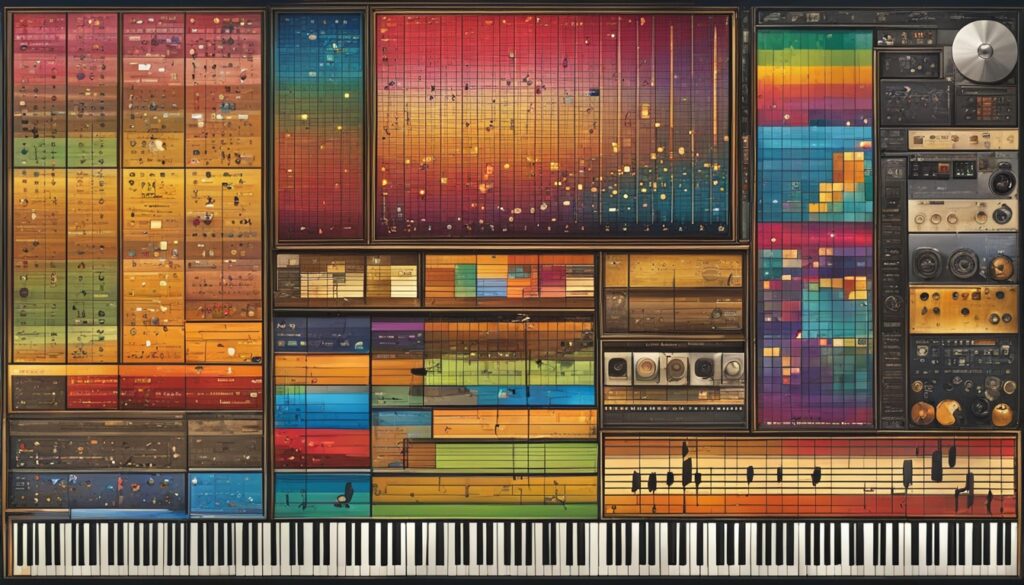
These honorable mentions give The Sound of Music’s music more variety. Let’s look at why these songs are unique:
- Number of honorable mentions listed: 208
- Distribution of genres among the honorable mentions: alternative, rap, techno, indie8
- Geographic references in the songs: NYC, Naples, Milwaukee8
- Average song length of the honorable mentions: about 4 minutes8
- Mention of TV shows featuring music in the honorable mentions: 18
- Use of unusual instruments or sounds: gassy bass, trembling synth sounds, heart-shaped eye, wide sounds8
- Language diversity among artists mentioned: English, Italian8
- References to specific cultural events or trends in the songs: internet culture, gaming music, postapocalyptic ideas8
- Variety of vocal styles exhibited: warbling, vibrato, rap, slurring8
- Explicit content in the lyrics: references to sex, emotional themes8
- Use of unique song titles: “Skibidi Toilet,” “SkeeYee” / DJ Ess’ Cyberspeed Mix8
These songs show The Sound of Music’s rich variety and artistic journey. Each brings a special touch to the whole musical experience.
Fan Opinions and Reactions

The Sound of Music has won over hearts everywhere. Its songs and story are unforgettable. Fans feel a deep impact from this classic.
When it came out in 1965, critics didn’t all agree9. Some called it too sweet and slow, but praised its songs and acting9. Julie Andrews’ role as Maria was especially loved for her talent9. Yet, musicals often get mixed reviews for seeming unreal, sparking debates among critics9.
Fans, however, mostly adore the film. On one platform, it got 18 out of 19 positive nods10. Its nostalgic charm and positive vibes have made it a family favorite10. The mix of laughter, tears, and songs ties it to many memories9.
Fan-Favorite Songs
Songs from The Sound of Music mean different things to fans. Iconic tunes like “My Favorite Things,” “Do-Re-Mi,” and “Edelweiss” are loved by many. These songs are special for their nostalgic and timeless appeal.
Other fans are touched by “Climb Ev’ry Mountain” and “The Sound of Music (Reprise).” These tracks stand out for their emotional power. They highlight hope and resilience, themes at the heart of the film.
But everyone has their own top picks. The most important thing is how the songs touch each fan. They bring back dear memories and stir emotions.
| Top Fan-favorite Songs from The Sound of Music | Rank |
|---|---|
| “My Favorite Things” | 1 |
| “Do-Re-Mi” | 2 |
| “Climb Ev’ry Mountain” | 3 |
| “Edelweiss” | 4 |
| “The Sound of Music (Reprise)” | 5 |
There are more songs loved by fans than mentioned here. Each one has a unique meaning to those who love the film. These show the variety of what fans enjoy.
The Sound of Music keeps winning hearts with its beautiful songs, story, and acting10. It’s a treasure worldwide, loved by people of all ages10.
The Legacy of The Sound of Music
The songs from The Sound of Music have captured hearts for years. Its timeless melodies and memorable characters have made the musical a piece of iconic culture. Fans across the globe continue to enjoy its magic, proving it’s a cherished classic.
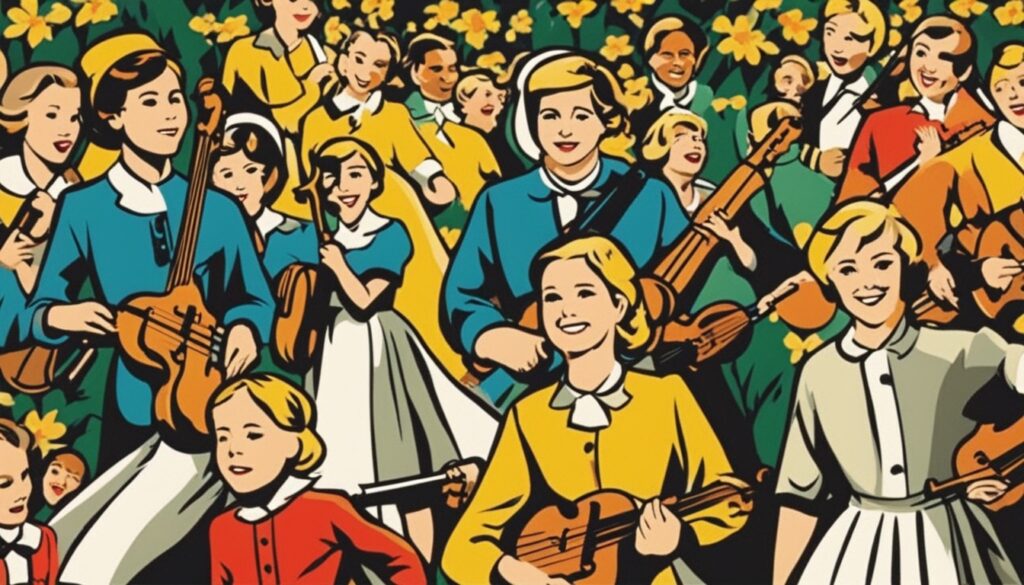
The longevity of The Sound of Music is astounding. Since its 1965 release, it’s been loved all over the world11. Julie Andrews shines as Maria Von Trapp, one of her most celebrated roles. Her success in Mary Poppins just a year before made her an ideal choice for this musical11.
Set before World War II, the movie transports us to 1938. It shows a world filled with romance and happiness before the war11. The Von Trapp family’s musical moments bring nostalgia and a wish for simpler times.
Music is key in The Sound of Music, standing for unity and love during war11. Memorable songs like “Do-Re-Mi” still touch people today. Maria’s love for music and her vibrant spirit have a lasting effect on those who watch11.
The film also highlights family courage against the Nazis. The Von Trapp family’s fight is moving, showing the power of standing together11. It underlines love, bravery, and standing for what’s right.
Choosing Salzburg for its scenes greatly added to the film’s success. Scenic places like Hohenwerfen Castle and Untersberg mountain beautify the story11. This stunning environment pulls viewers into the captivating world of The Sound of Music.
The Enduring Impact on Music
The music from The Sound of Music has deeply influenced the industry. Its soundtrack hit No.1 on the Billboard chart in 196512. Songs like “My Favorite Things” remain loved classics, covered by artists even now.
For its 50th anniversary, there was a special soundtrack re-release12. Along with the original, a vinyl edition came out, bringing renewed interest in these amazing songs.
The soundtrack stands out because it was recorded live. The children sang together at seven microphones, showcasing their talent12. This genuine element added charm to the film’s songs.
The actors had personal connections to the songs they sang. Each child had a different favorite, showing the soundtrack’s wide appeal12. Favorites included ‘So Long, Farewell’ and ‘My Favorite Things.’
A Timeless Tribute to Film and History
The Sound of Music’s 50th anniversary highlights its lasting charm. Being re-released in theaters, this 1965 movie still captures hearts13. Its timeless tale, exceptional acting, and cultural impact confirm its status as a cinematic treasure.
Christopher Plummer and Julie Andrews have been celebrated for their roles. Plummer’s portrayal of Captain Von Trapp was acclaimed. He later won an Academy Award in 201213.
Julie Andrews won audiences over as Maria. Her role brought her significant earnings and fame. Her talent and charm light up the film, making her a Hollywood icon13.
The Sound of Music received well-deserved acclaim, winning the Best Picture award in 196513. Despite some early criticism, it’s now seen as a timeless classic that continues to resonate with people everywhere.
The film’s cast went on to have successful careers. Julie Andrews won a Golden Globe for Mary Poppins. Plummer starred in many films, like The Man Who Would Be King13. Their contributions have added to the film’s enduring legacy.
Originally a Tony-winning Broadway musical, The Sound of Music became a cultural icon as a film13. Robert Wise’s direction made it a legendary movie that’s beloved over time13.
The 50th anniversary spurred discussions on its lasting legacy13. It’s clear that The Sound of Music has made a significant mark in history and continues to be loved by fans worldwide.
| Key Factors Contributing to The Sound of Music’s Legacy |
|---|
| Enduring global popularity |
| Idyllic portrayal of pre-war period |
| The power of music in the face of war |
| Theme of family solidarity |
| Choice of Salzburg as filming location |
The legacy of The Sound of Music crosses time, enchanting with its songs, story, and characters111213. Its lasting popularity and musical impact show why it’s so special. The setting, uplifting music, and themes continue to inspire people all over the world.
The Sound of Music: A Musical Masterpiece
The Sound of Music has been loved for over 50 years. Since its 1965 release14, it has told the warm tale of Maria and the von Trapp family. It’s a story filled with inspiring songs.
Its songs have made a mark in our culture15. Hits like “Do-Re-Mi” and “Edelweiss” are unforgettable for their emotions and story depth15. These tunes speak to all ages, becoming timeless treasures15.
The movie includes familiar themes like love triangles and adventure dreams14. Yet, it brings these ideas to life in a fresh, real way14. We see kids behaving like real kids – curious, sad, or angry14. Liesl and Rolf’s love, and the Baroness’s depth add more layers14.
Maria, the lead, is deeply human14. She faces doubt and makes mistakes, making her more relatable14. This gives the movie a unique edge over typical musicals and films14.
Fans still adore The Sound of Music. Its soundtrack sold over 25 million copies globally16. It topped the UK charts for 70 weeks and was the top album of the year more than once16. The Super Deluxe Edition includes over 40 new tracks, highlighting the music’s richness16.
The film got 10 Oscar nominations and won 5, including Best Picture15. Its songs are covered by artists across genres, proving their lasting appeal15.

The Sound of Music remains a beloved classic. Even decades later, it captures hearts with its songs and story14. Its contribution to music and film is unmatched. This makes it a cultural icon for future generations.
The Sound of Music: A Cultural Phenomenon
The Sound of Music has gone beyond just being a musical. It became a huge cultural event since its release in 1965. Its soundtrack album topped the UK sales charts for many years17. Today, it’s a beloved classic worldwide.
This movie is famous for its unforgettable songs and gripping story. It is more loved than other classics like “Singin’ in The Rain.”17 What makes it stand out is its focus on music over plot. This shows the strong impact songs have in connecting with viewers17.
The movie also sparked the Sing-a-long Sound of Music trend. Fans dress up and join in during screenings. This event shows the film’s deep cultural impact. Its songs have become part of our shared memories and experiences17.

The Sound of Music has greatly influenced the entertainment world and many places. It remains beloved in the United States18. The film has also boosted tourism in Salzburg, Austria, where it was filmed19. Tourists visit famous locations from the movie, stepping into its magical world.
At first, critics did not like the film. But now, it’s celebrated as a classic19. Its popularity might come from the strong feelings it evokes in people19. While some see it as an escape, others feel deeply connected to its emotional storytelling.
| The Sound of Music Statistics |
|---|
| Third biggest box office success of all time |
| Beloved phenomenon, popular globally |
| Salzburg benefits significantly from tourism related to the movie |
| Initially faced harsh criticism, but opinion has evolved |
| Recognized as wish-fulfillment and emotional |
The Sound of Music moves people deeply with its strong songs and story. It speaks of love and family in a real way. For many, it’s more than just a story of hope; it’s a reflection of their own feelings19.
Conclusion
The Sound of Music shows how music can break barriers and touch hearts around the world. The top songs from this beloved musical still win over people today. They have remained popular over many years.
Evelyn Glennie and Bismillah Khan are famous musicians who overcame hard times with determination and passion. Despite being profoundly deaf, Evelyn Glennie became a famous percussionist. Her talent has inspired many20. Bismillah Khan brought the shehnai to worldwide fame, creating a lasting legacy in music20.
The von Trapp children’s performances in “So Long, Farewell” continue to enchant listeners21. Since its 1959 debut, The Sound of Music has been a cultural icon. It was released when Hawaii became the 50th state21. Songs like “So Long, Farewell” grab people’s emotions and have a wide appeal21.
Evelyn Glennie and Bismillah Khan show us the wonders of human creativity and music’s power. They faced challenges but stayed true to their music, making an unforgettable impact22. The Sound of Music also highlights the lasting impact of Rodgers and Hammerstein II. Their songs and lyrics still bring people together from all walks of life.
FAQ
What are the top-ranked songs from The Sound of Music?
How are the songs ranked in The Sound of Music?
Which songs rank at the bottom of The Sound of Music’s song list?
What are the mid-ranked songs in The Sound of Music?
Which songs are considered the top ten hits from The Sound of Music?
Which songs in The Sound of Music are considered honorable mentions?
What do fans think about the song rankings in The Sound of Music?
What is the legacy of The Sound of Music’s songs?
What makes the songs of The Sound of Music iconic?
How have the songs from The Sound of Music become ingrained in popular culture?
How can I experience the magic of The Sound of Music’s songs?
Source Links
- https://ew.com/article/2013/12/04/sound-of-music-best-worst-songs/ – ‘The Sound of Music’: We rank every song
- https://www.watchmojo.com/articles/top-10-best-sound-of-music-songs – Top 10 BEST Sound of Music Songs | Articles on WatchMojo.com
- https://www.bustle.com/articles/68494-a-definitive-ranking-of-the-sound-of-music-soundtrack – A Definitive Ranking Of The ‘Sound Of Music’ Soundtrack
- https://screenrant.com/every-song-sound-of-music-ranked/ – Every Song In The Sound Of Music, Ranked
- https://www.billboard.com/lists/sound-of-music-soundtrack-deluxe-edition/ – Our 5 Favorite Things From ‘The Sound of Music’ Super Deluxe Edition Soundtrack
- https://www.billboard.com/lists/top-movie-songs-of-all-time/ – The Top 75 Movie Songs of All Time
- https://en.wikipedia.org/wiki/The_Sound_of_Music_(film) – The Sound of Music (film)
- https://www.kprblog.fyi/p/my-top-10ish-songs-of-2023-plus-20 – My top 10ish songs of 2023 (plus 20 honorable mentions)
- https://www.theguardian.com/film/2018/may/16/why-the-sound-of-music-led-the-way-for-the-critic-proof-hit-musical – How The Sound of Music led the way for the critic-proof hit musical
- https://www.imdb.com/title/tt0059742/reviews – The Sound of Music (1965) – IMDb
- https://www.salzburgerland.com/en/the-background-and-how-the-sound-of-music-became-so-popular/ – How The Sound of Music Won Over The World
- https://www.billboard.com/music/music-news/sound-of-music-soundtrack-anniversary-inside-original-recording-sessions-6487475/ – ‘The Sound of Music’ Soundtrack Turns 50: Inside the Original Recording Sessions
- https://www.vanityfair.com/hollywood/2015/02/sound-of-music-julie-andrews-christopher-plummer-50-anniversary – For Julie Andrews and Christopher Plummer, The Sound of Music Was Never So Long, Farewell
- https://morganboyerpoet.wordpress.com/2017/11/25/how-the-sound-of-music-is-also-a-literary-masterpiece/ – How the “Sound of Music” is also a literary masterpiece
- https://www.edsullivan.com/artists/the-sound-of-music/ – The Sound Of Music – Ed Sullivan Show
- https://concord.com/news/craft-recordings-celebrates-the-enduring-legacy-of-rodgers-hammersteins-cinematic-treasure-the-sound-of-music-with-a-definitive-super-deluxe-edition-of-its-beloved-soundtrack/ – Craft Recordings Celebrates the Enduring Legacy of Rodgers & Hammerstein’s Cinematic Treasure The Sound of Music With a Definitive, Super Deluxe Edition of Its Beloved Soundtrack – Concord
- https://www.bbc.com/culture/article/20150302-our-favourite-thing – The Sound of Music at 50: Our favourite thing?
- https://www.vontrapp.org/the-sound-of-music.html – vonTrapp.org | SOM
- https://christinawehner.wordpress.com/2015/07/16/the-sound-of-music-not-just-escapism-a-defense/ – The Sound of Music: Not Just Escapism – A Defense
- https://www.toppr.com/guides/english/english-beehive/the-sound-of-music-summary/ – The Sound of Music Summary Class 9 English | English Beehive
- https://rodgersandhammerstein.com/song/the-sound-of-music/so-long-farewell/ – So Long, Farewell – Song from The Sound of Music by Rodgers & Hammerstein
- https://www.vedantu.com/english/the-sound-of-music-summary – The Sound of Music Summary

